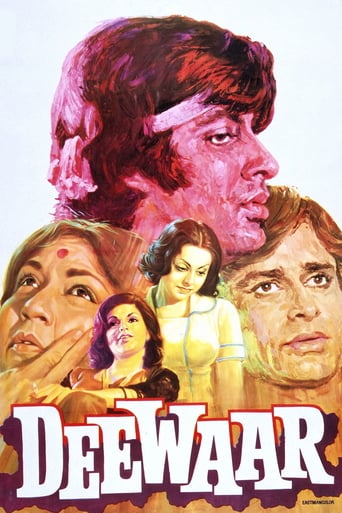
It says quite a lot about Hindi cinema when one of it’s more iconic and acclaimed movies from its golden age is an unimaginative, poorly directed embarrassment. Unfortunately, that is exactly what Yash Chopra’s 1975 crime film, “Deewaar”, is. My guess is that Hindi Cinema is full of numerous films that are worse than this one, which is not saying very much about the industry.
In the 1970s, Hindi cinema developed from being primarily romantic musicals to having grittier crime-related urban themes. “Deewaar” deals with an age-old story about two brothers who go in two completely different directions that lead to a major clash. After the father of a trade union leader, Anand Verma (Satyen Kappu), is forced to comply with a corrupt business executive and turn against the people he represents, he is ostracized by everyone and chooses to run away and desert his family without giving them any means of making a living. His eldest son, who is currently only a small boy, is branded by his neighbors with a sign proclaiming his father is a thief. Verma’s wife (Nirupa Roy) takes her two small children away from the industrial town to the big city of Bombay or Mumbai of today. There they sleep on the streets while both the mother and her eldest son work with the aim of retaining a hovel to live in and sending the youngest son to school. The two sons, Vijay (Amitabh Bachchan) and Ravi (Shashi Kapoor) grow up with Ravi getting a degree and Vijay working, the docks as a porter. Vijay will then work his way into leading a crime family of smugglers, while Vijay uses the education that Ravi helped pay for to get hired by the police force. As a police officer, he is then assigned the job of putting away his gangster brother in a typical good brother against bad brother storyline. After the great commercial success of this movie, the good brother vs bad brother plot would repeat itself in countless Hindi films.
This is a movie that is heralded for its historically influential attributes. For example, the anti-hero (Vijay) uses Hong Kong martial arts skills in his climb to the top of the crime empire, which helped pave the way for Hindi martial arts movies going forward. Not that anyone would confuse the unexciting amateurish fighting scenes in this movie with one of Bruce Lees’ fighting sequences. In addition, the more realistic portrayals of violence in the movie were something previously not seen in Hindi Cinema and paved the way for more realistic cinema. Another unique feature for Hindi films was the portrayal of Vijay by the excellent Indian actor Bachchan as somewhat sympathetic. Previous to this film, there was a clear designation as to good and bad in Hindi films. Here, while his actions are not moral in any sense, Vijay is driven to them by his need to care for his mother. It is when his mother takes the side of his brother that his world starts to fall apart.
At the time this movie came out, musical interludes were important to Hindi films. These are not stage presentations but rather fantastical scenes of incredulity whereby characters suddenly break out in a song and dance. Chopra was smart enough to limit these musical interludes to only two characters. That is the good brother Ravi and his fiancé. For me, even in this limited fashion, the interruption of a crime drama with a corny love sonnet is absurd and completely misplaced. Even for a Hindi movie. In addition, all six of the songs are bland and unmemorable.
Out of all its shortcomings, the element of the movie that irked me the most was its simplistic narrative that left no place for law and order or any sort of strategic thinking. What is considered a bold plan in this movie usually consists of something in the vein of, “you sign the paper, or I kill your family”, or, “take this password to the dock, and they will just hand over the goods to you”. Sophistication is not a word I would use to describe the screenwriting of this movie. This may be mostly due to the producers realizing that many third world viewers in other countries where Hindi films were popular are illiterate and need a simplistic plot to follow along.
In addition, the direction style of Chopra with its quick close-ups and brutal point of view changes is quite jarring, making for a cheap-looking movie. Luckily for him, he gets some good performances from his cast, and special mention needs to be made of the performance of Bachchan as Vijay. Watching this performance, I got the feeling that Al Pacino watched it and used it for his performance in, “Scarface”.
Even with the understanding that Hindi movies aim at a different type of audience, I still could not get through the simplistic story and shoddy direction of this apparently iconic film. “Deewaar”, which means the wall that separates the brothers, is not at the level of the best Hindi movies such as, “Mother India”, and for someone who is not a great fan of Hindi films, was a waste of almost three hours of my life.

